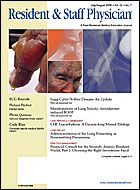Publication
Article
Resident & Staff Physician®
Why the AMA's Top 3 Agenda Items Are Relevant to You
Author(s):
Jeff Oscar Gonz?lez, MD
Dear Colleague,
This past April I had the pleasure of speaking at the South Carolina Medical Association's Resident and Fellow Section (RFS) Annual Meeting. At the conclusion of my talk, I was approached by an attendee who was excited to hear about the American Medical Association's (AMA's) legislative agenda. She was disappointed, however, that no one had communicated our agenda to her before. So, I would like to tell you, too, about the top 3 agenda items and show you why they are important to you now as a resident.
Medical Liability Reform
If you say, "I'll go to a state where there is no crisis," you only have 30 states to choose from. The AMA has identified 20 states that are in a medical liability crisis. It is clear to most rational citizens that we are living in a civil justice system crisis—a system that is neither civil nor just. Here is why:
- 1 in 7 obstetricians are no longer delivering babies
- 125,000 lawsuits are currently in the system
- 50% of neurosurgeons and more than 30% of trauma surgeons, orthopedic surgeons, and other high-risk specialists are being sued every year.
Recent surveys have shown that 79% of physicians practice "defensive medicine," which costs the United States between $83.9 and $151.1 billion per year. This amount is more than enough to cover all uninsured Americans. Although many politicians do not understand or do not want to accept the magnitude of this problem, 72% of Americans support health reforms.
The AMA supports legislation that has passed the House of Representatives 7 times, most recently in March 2003, which ensures that patients receive full and fair compensation for their economic losses, including medical expenses, rehabilitation costs, lost wages, and more, if harmed by a physician's negligence. The plan maximizes the amount of money juries award to patients—not trial lawyers—and enables patients to receive up to $250,000 in noneconomic damages.
Unfortunately, the Senate has not had the 60 votes needed to force a vote on the floor. You can help by calling your 2 senators and asking them to support Senate Bill 11, the Patients First Act. Also make sure you ask them to allow for a vote on the bill.
Physician Payment Cuts
"As a resident, why do I care about how much private doctors get paid for seeing Medicare patients? I'll worry about it when I'm done with my training." This is the thinking of many residents. I guess they might not mind skipping a pay increase next year. Or how about a pay cut? Or less nurses and support staff? This scenario is a possibility because the pending cut in Medicare payments directly impacts our training. The Medicare program is the primary source of funding for Graduate Medical Education (GME), providing 74% of GME funding. And as of January 1, 2006, there will be a 4.3% cut in reimbursements. The Medicare Trustees have further reported forecasts of a 26% cut in Medicare physician payment rates from 2006 through 2011.
The AMA is pushing to eliminate the sustainable growth rate (SGR) formula that determines Medicare physician payments. This formula ties physician payments to the ups and downs of the US economy, not to the health care needs of America's seniors, whose needs do not wane with the economy. We need a new system based on practice costs so that Medicare patients do not suffer from disruptions in their care. Long-term financing reforms to accommodate the influx of baby boomers into Medicare must also be made so that the program remains viable for generations to come.
Lack of Health Insurance
More than 85% of the uninsured are in families headed by a worker, many of whom are low-income workers who cannot afford the employee's share of the insurance premium. Of employers who offer heath benefits, more than 90% provide employees with only one plan—a take-it-or-leave-it option. And in order to get the government subsidy for health insurance, employees must accept whatever plan or plans their employers choose, and individuals without employee health benefits get no subsidy at all. Higher-income patients—because they are in higher tax brackets—reap the lion's share of the subsidy—two thirds of the more than $100 billion tax subsidy for health insurance goes to the wealthiest one third of American families. But because employers, rather than employees, choose health insurance, plans are not responsive to individual demand for access, quality, and affordability.
The AMA believes that the current government subsidy should be redirected to those who need the most assistance obtaining health insurance, and that individuals should have a greater choice of health plans. The main elements of the AMA reform proposal include:
•Moving to a system of individually selected and owned health insurance
•Replacing the existing tax exclusion for employee health benefits with tax credits to individuals and families for the coverage of their choice
•Making tax credits refundable, that is, if patients do not owe taxes, they are still eligible for the credit; advanceable, which means that patients can receive it before the end of the year so that they can pay for coverage; and inversely related to income—the less patients earn, the larger the credit they receive
•Fostering the development of health insurance markets that allow alternative venues for obtaining coverage, offering a wide range of affordable coverage options, and rewarding product innovation.
Please take some time to learn more about these issues and the rest of the AMA agenda by going to our grassroots Web site at www. ama-assn.org/go/grassroots. Here you will find in-depth information along with the ability to easily send letters and e-mails to your representatives. You can also call your legislators free of charge by using the AMA's grassroots hotline at (800) 833-6354.
Jeff Oscar González, MD
Chair, AMA-RFS
Jackson Memorial Hospital/University of Miami
Division of Gastroenterology
